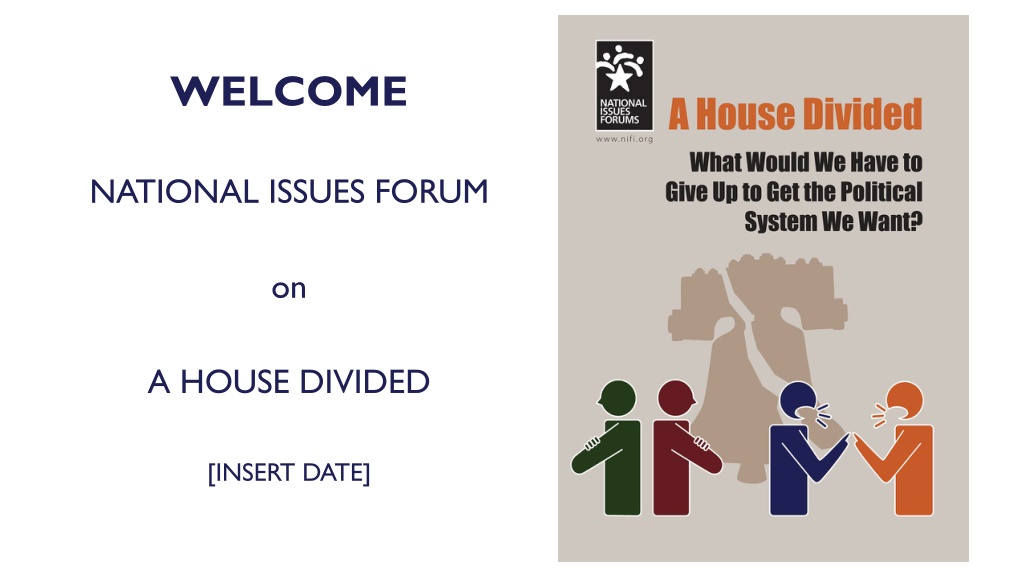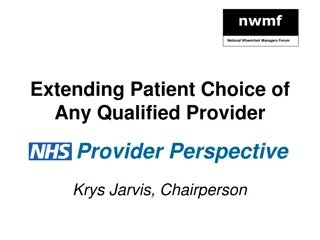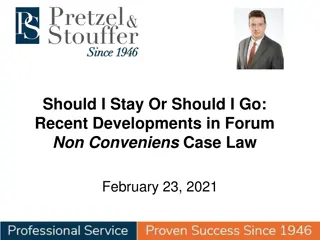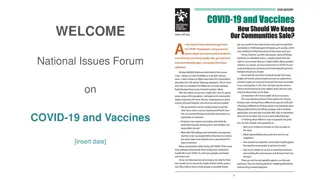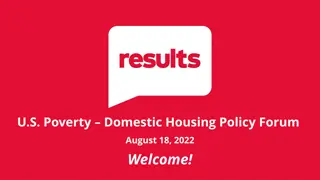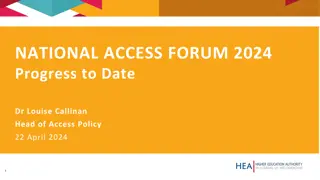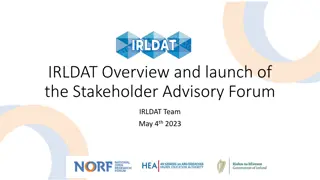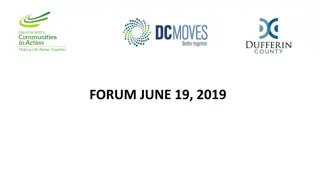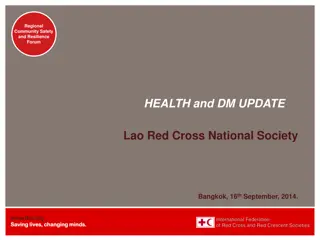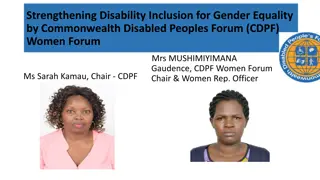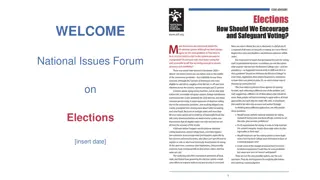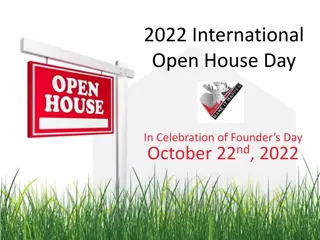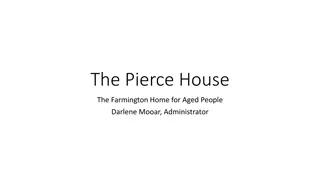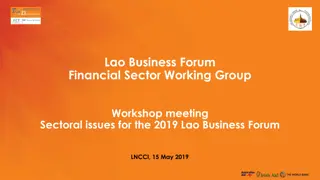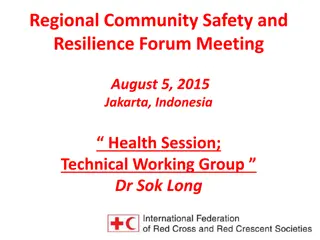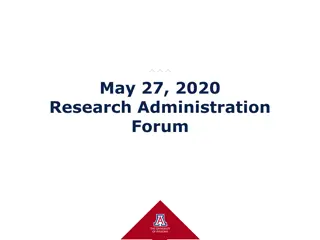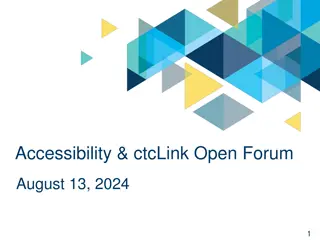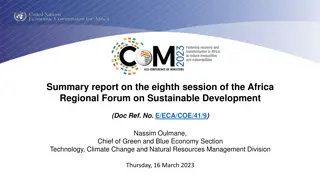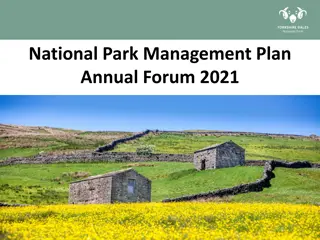National Issues Forum on a House Divided
A House Divided forum focuses on the toxic nature of public discourse, aiming to reduce dangerous talk online and in media. Participants discuss potential actions such as regulating hate speech, promoting diverse viewpoints, and protecting freedom of speech in various settings, including college campuses. The forum encourages open dialogue, reflection on common ground, and consideration of the impact of divisive rhetoric on individuals and communities.
Download Presentation

Please find below an Image/Link to download the presentation.
The content on the website is provided AS IS for your information and personal use only. It may not be sold, licensed, or shared on other websites without obtaining consent from the author. Download presentation by click this link. If you encounter any issues during the download, it is possible that the publisher has removed the file from their server.
E N D
Presentation Transcript
WELCOME NATIONAL ISSUES FORUM on A HOUSE DIVIDED [INSERT DATE]
Holding a Deliberative Forum 4. Review and Reflect 3. Consider Each Option 1. Introduction 2. Connect to Issue Review ground rules. Review the conversation as a group. What areas of common ground were apparent? What tensions and trade-offs were most difficult? Whom else do we need to hear from? Ask people to describe how the issue affects them, their families, or friends. Consider each option one at a time. Introduce the issue. Allow equal time for each. What is attractive? What about the drawbacks?
Ground Rules for a Forum Focus on the options and actions we can take nationally and in our communities. Consider all options fairly. Listening is just as important as speaking. No one or two individuals should dominate. Maintain an open and respectful atmosphere. Everyone is encouraged to participate.
STARTER VIDEO https://www.nifi.org/en/issue-guide/house-divided
Option 1: Reduce Dangerous, Toxic Talk The problem is that the way we talk is poisoning public life. The outrage industry rewards people for saying and doing the most extreme things. Public figures vie for attention on TV and online. Fringe groups feel empowered to spread their hate and conspiracy theories. The lines between news, opinion, and entertainment are erased. We don t know whom to believe anymore. And if people say the wrong thing, they are attacked because they were not politically correct. News networks and social media must do much more to control hate speech. We need to stop rewarding outrage and bring back common sense. A Primary Drawback This gives media and internet decision-makers enormous power to determine what people can say about each other or about public issues. Who gets to decide what s outrageous and what s not?
Option 1: Reduce Dangerous, Toxic Talk Possible Actions Facebook and other social media platforms and internet service providers should kick out users who use slurs or profanity or threaten physical violence. Drawbacks Internet companies could become the language police, threatening people s right to express themselves freely. Require all television networks to provide opposing views on controversial issues. This reduces complex debates to pro and con voices and means that important voices may never be heard. Make websites and television stations liable for allowing ads that make unproven or false charges about political candidates. This would unleash a flood of lawsuits from every frustrated politician. Protect freedom of speech on college campuses by protecting professors, students, and speakers who espouse unpopular or politically incorrect views. Students can t learn and thrive in a disrespectful atmosphere where they feel threatened and undermined. The trade-off? What else?
Option 1: Reduce Dangerous, Toxic Talk Possible Actions Facebook and other social media platforms and internet service providers should kick out users who use slurs or profanity or threaten physical violence. Require all television networks to provide opposing views on controversial issues. Make websites and television stations liable for allowing ads that make unproven or false charges about political candidates. Protect freedom of speech on college campuses by protecting professors, students, and speakers who espouse unpopular or politically incorrect views. What else?
Option 2: Make Fairer Rules for Politics and Follow Them The problem is that wealthy, powerful special interests game the political system, making it impossible to find compromise. Candidates play to their bases rather than trying to reach a broader range of people. The flood of money into campaigns and lobbying gives too much power to special interests. The major political parties redraw election districts to their advantage, which means more partisanship in Washington, DC. Elected officials leave Congress and join multimillion dollar lobbying firms, giving their clients access and power not available to ordinary people. It s time to reduce the power of money in politics, correct the flaws in our system that reward such extreme partisanship, and restore the tradition of compromise that has served this nation well in the past. A Primary Drawback This may do too much to limit the ability of Americans to fight for their principles and give too much power to those who don t seem to care enough to vote and participate. This option focuses on compromise and changing the rules, but doesn t our system need more fundamental changes?
Option 2: Make Fairer Rules for Politics and Follow Them Possible Actions Remove the burdensome registration and scheduling barriers that make voting difficult for so many Americans. Too many people are being shut out. Drawbacks This makes voting more like a choice than the duty it is. These requirements protect us against voter fraud and manipulation. Revise the 1965 Voting Rights Act to forbid new laws or requirements that could make it harder for minorities or poor people to vote. Limiting requirements like showing a photo ID could leave the voting system vulnerable to manipulation or fraud. Create nonpartisan commissions to draw election districts based on population patterns so politicians don t design them to favor their own party. In some legislative districts, minority groups would lose power. Strictly limit how much outside groups and individuals can contribute to candidates and PACs, even by Constitutional amendment if necessary. This would limit the ability of all kinds of groups and donors to participate, including those fighting for causes and candidates we ourselves support. The trade-off? What else?
Option 2: Make Fairer Rules for Politics and Follow Them Possible Actions Remove the burdensome registration and scheduling barriers that make voting difficult for so many Americans. Too many people are being shut out. Revise the 1965 Voting Rights Act to forbid new laws or requirements that could make it harder for minorities or poor people to vote. Create nonpartisan commissions to draw election districts based on population patterns so politicians don t design them to favor their own party. Strictly limit how much outside groups and individuals can contribute to candidates and PACs, even by Constitutional amendment if necessary. What else?
Option 3: Take Control and Make Decisions Closer to Home The problem is that our most important decisions are being made too far away from home. When the national government is embroiled in political infighting, problems go unsolved. It s time to put decision-making back in the hands of people who live and work closely together, share goals and values, and can act quickly. Communities across the nation, frustrated by inaction in Washington, already are moving to address problems they re familiar with at the ground level. A Primary Drawback This will result in different protections and standards across the country and produce a patchwork of rules on major national challenges such as infrastructure, environmental protection, and immigration. We are one country. Don t we need a united approach to urgent problems rather than a piecemeal one?
Option 3: Take Control and Make Decisions Closer to Home Possible Actions Drawbacks Dramatically reduce cumbersome federal regulations on the environment, energy, and transportation. Local residents have a much better understanding of what their communities need. We will never get improvements in the environment, energy, and transportation with individual states going every which way. Give states money without restrictions for major federal programs such as Medicaid and education so states can adapt them to fit their own needs. Basics such as food, shelter, high-quality education, and essential health care should be available to all Americans, no matter where they live. This would turn these decisions over to local politicians. Local governments should rely much more on community groups, organizations, and churches to address issues like crime, health, and welfare. Vulnerable Americans could suffer in communities that do not have the resources or willingness to take on these problems. Return full control and funding of K-12 public education to local communities and the states so residents can determine what s best for their own children. Federal grants help schools with low-income students, and some communities may have to raise property taxes to close the gap. What else? The trade-off?
Option 3: Take Control and Make Decisions Closer to Home Possible Actions Dramatically reduce cumbersome federal regulations on the environment, energy, and transportation. Local residents have a much better understanding of what their communities need. Give states money without restrictions for major federal programs such as Medicaid and education so states can adapt them to fit their own needs. Local governments should rely much more on community groups, organizations, and churches to address issues like crime, health, and welfare. Return full control and funding of K-12 public education to local communities and the states so residents can determine what s best for their own children. What else?
Reflections on Your Forum
Post Forum Questionnaire Now that you ve had a chance to participate in a forum on this issue, we d like to know what you re thinking. Anonymous responses will be included in summary reports on the forums and in research to help us better understand how people are thinking about current issues. You may fill out this questionnaire online. www.nifi.org/questionnaires. THANK YOU!
